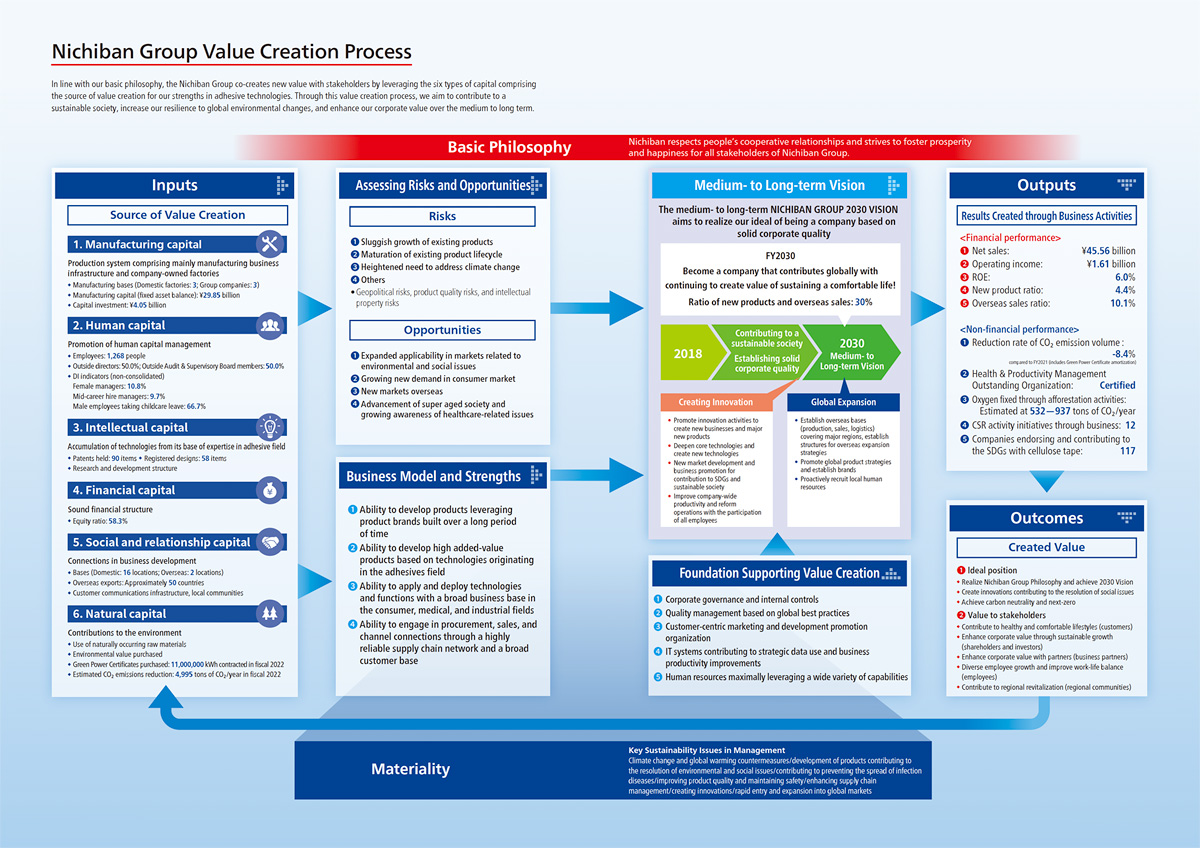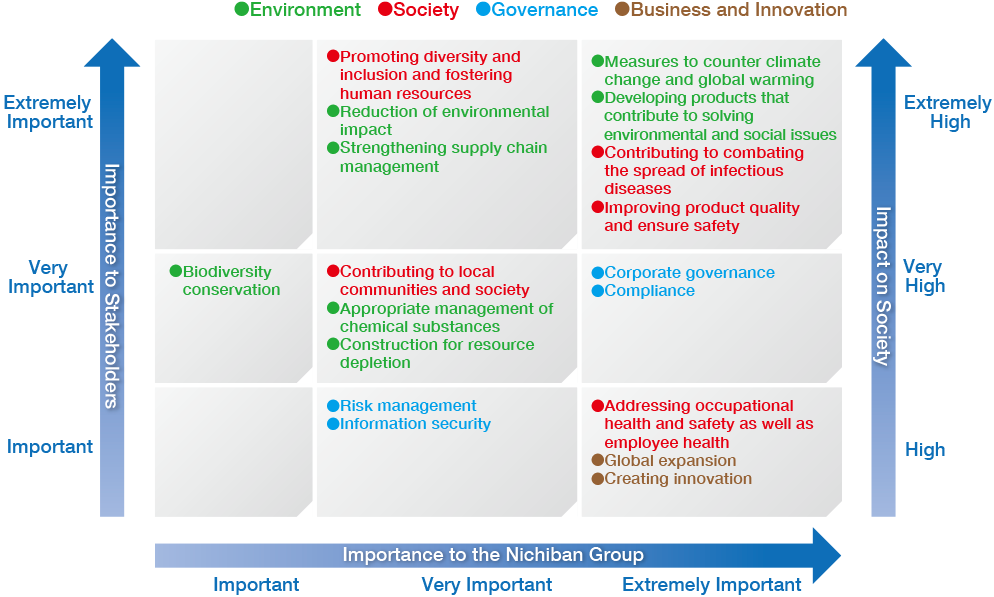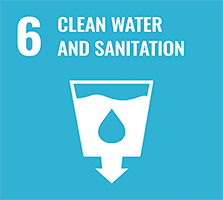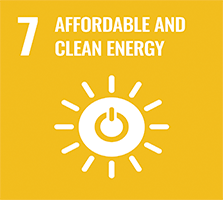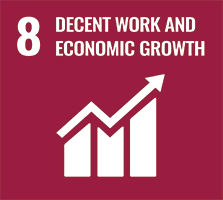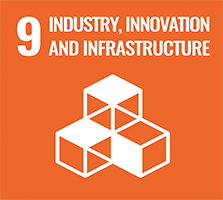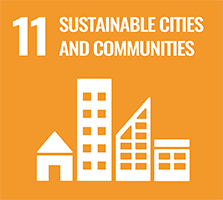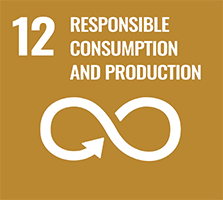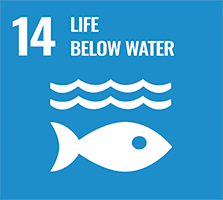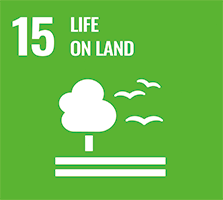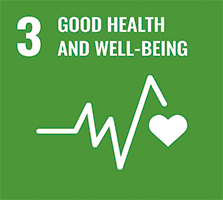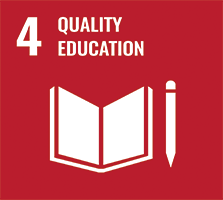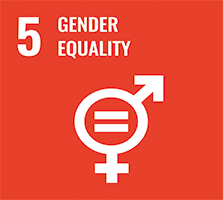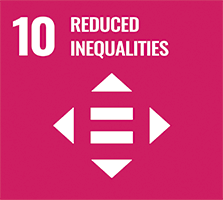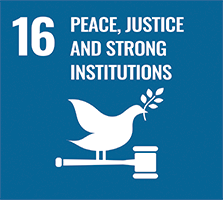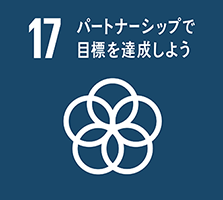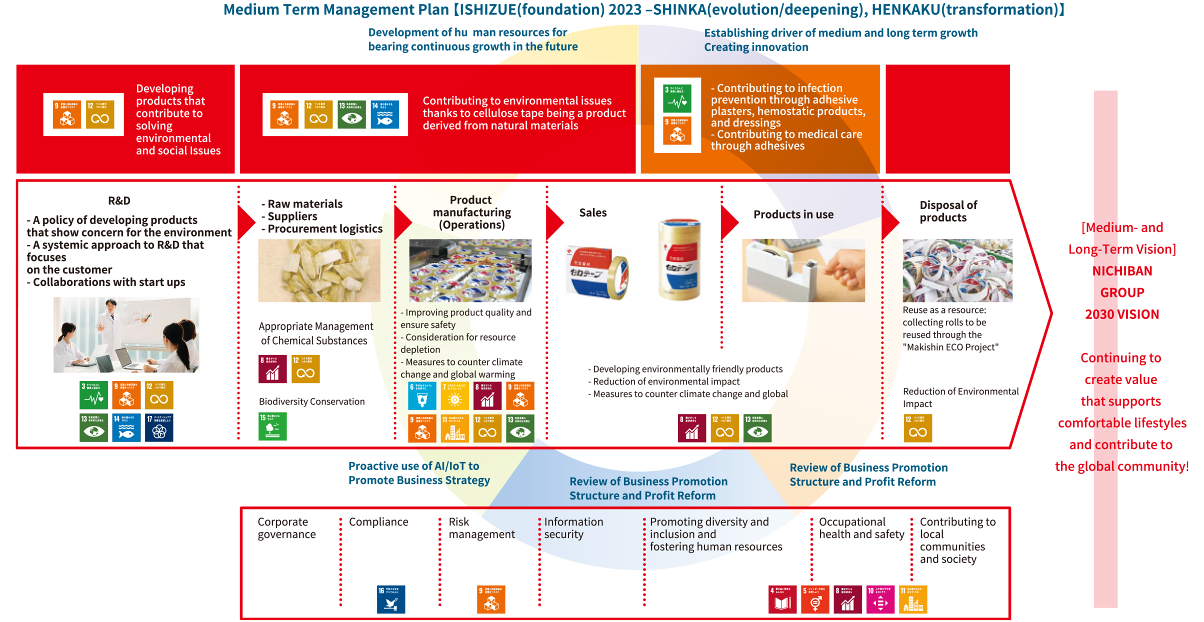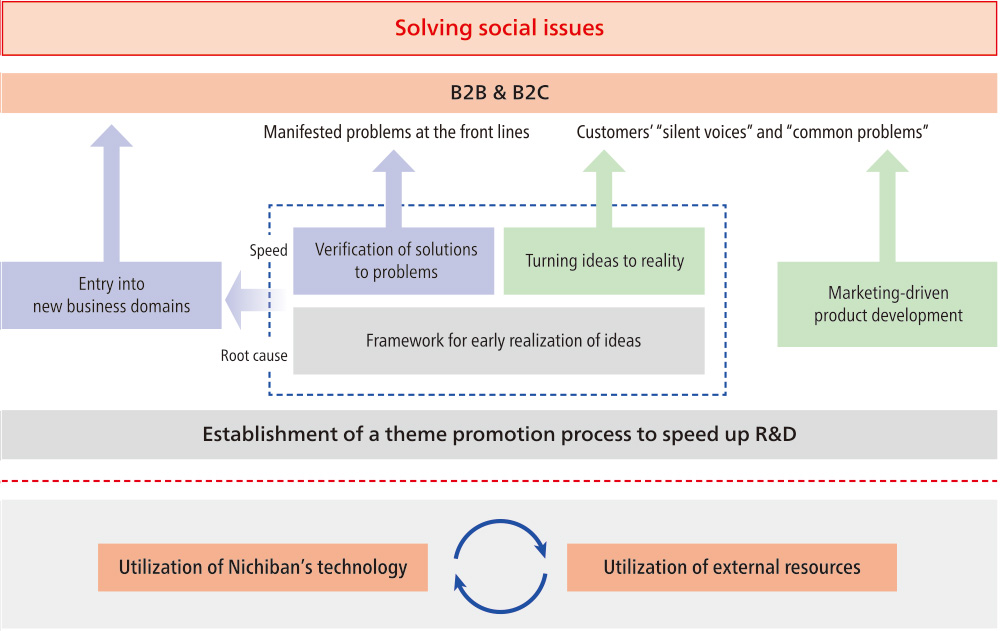| Environment |
Developing products that contribute to solving environmental and social issues |
- Formulation of development criteria for products that contribute to solving environmental and social issues
- Promote environmentally friendly development themes and new product development
- Contribute to further environmental issues by increasing the proportion of natural materials in products
|
- Conducted a survey of energy use within internal processes as one of the indicators applicable to product development standards
|
- Establish calculation method for product CO₂ emissions Promote development themes that address environmental and social issues
|
|
| Reduction of environmental impact |
- Continued operation of ISO 14001 environmental management system and implementation of audits
- Reduction of solvent usage through creation of new technologies
- Disclosure of environmental information
|
- Engaged in ongoing ISO 14001 certifications, raised the level of environmental awareness among all employees and internal auditors, and maintained efforts to improve environmental management system.
- Promoted efforts to reduce solvent use
- Actual energy consumed: 5.14 million TJ of calorific value (516 TJ in fiscal 2021)
- Scope 1 and 2 CO₂ emissions: 20,710 tons of CO₂ (22,620 tons of CO₂ in fiscal 2021)
- Acquired FSC® certification
|
- Maintain ISO 14001 certification and improve the level and quality of management
- Eliminate solvent use in current products
- Reduce energy consumption during production
- Publish Nichiban Group Integrated Report 2023 (Japanese and English languages)
|
| Appropriate management of chemical substances |
- Promote green procurement of raw materials
|
- Maintained appropriate procurement management based on the Nichiban Group Green Procurement Guidelines
- Continued to appropriately respond to requests for external investigation of chemical substances contained Nichiban products
|
- Ongoing promotion of green procurement and response to requests from customers to investigate chemical substances contained in products
|
| Measures to counter climate change and global warming
|
- Reducing CO₂ emissions across the Nichiban Group
- Increasing the ratio of green electricity and install solar power generation facilities
|
- Disclosed information based on the recommendations of the Task Force on Climate-related Financial Disclosures (TCFD).
Continued to target a 40% reduction in Scope 1 and 2 emissions by fiscal 2030 and 100% by fiscal 2050 (compared to fiscal 2013)
- Established calculation methods for Scope 1, 2, and 3 emissions
- Solar power generated: 494,000 kWh
- Green Power Certificates purchased: 11,100,000 kWh
|
- Disclose information based on the recommendations of the Task Force on Climate-related Financial Disclosures (TCFD) and the results of Scope 1, 2, and 3 calculations in the June 2023 Corporate Governance Report
|
| Consideration for resource depletion
|
- Reduction of waste through effective use of raw materials
- Efficient use of water and management of wastewater treatment
- Conversion from thermal recycling to recycling
|
- Continued to achieve “zero emissions” by recycling more than 99% of waste
- Water consumption: 687,000 m³ (2% reduction from fiscal 2021)
- Launched search for product scrap recycling technologies
|
- Maintain zero-emission plants
- Water input → 2% reduction year-on-year
- Explore recycling technologies
|
| Biodiversity conservation
|
- Makishin ECO Project tree-planting activities and Gounogawa “forest drop” conservation activities
|
- Conducted the 13th Nichiban Tape Core ECO Project
- Oxygen fixed through afforestation activities: Estimated at 532–937 tons of CO₂/year
|
- Continue implementation of the Nichiban Tape Core ECO Project, improve contribution and engagement with NGOs
|
| Society |
Improving product quality and ensure safety |
- Continuing operation of ISO 9001 quality management system and implementation of audits
- Improving customer satisfaction
- Begin introducing new core systems for strategic data utilization and improved internal business productivity
- Promoting company-wide improvement activities
|
- Engaged in ongoing ISO 14001 certifications, and maintained efforts to improve design quality, manufacturing quality, and customer satisfaction
- New backbone system: Introduced at Nichiban, three domestic Group companies, and one overseas Group company to promote operational standardization
- Teams engaged in production improvement activities: 55
|
- Maintaining ISO 9001 and improve management level and quality
- Conducting CS surveys
- Realizing internal operational efficiency improvement using the new core system and confirmation of the effectiveness overview document
- Promoting the use of advanced marketing data in sales measures
- Promoting efficiency, waste reduction and energy conservation in company-wide improvement activities
|
|
| Addressing occupational health and safety as well as employee health
|
Promoting health and productivity management
- [Policy 1]
Prevent the occurrence and severity of diseases such as lifestyle-related diseases
- [Policy 2]
Prevent the occurrence of stress-related diseases such as mental health problems
- [Policy 3]
Raise health awareness
- [Policy 4]
Establish an environment to promote health management
|
- Formulated the Nichiban Group Health Management Policy and promotion structure, compiled and disclosed issues based on action guidelines
- Certified as a 2023 Japanese Health and Productivity Management Outstanding Organization
|
- Identifying issues from a prevention perspective
- Raising health awareness
- Establishing an environment to promote health and productivity management
|
| Promoting diversity and inclusion and fostering human resources
|
- Promoting women's activities and employment of people with disabilities
- Promoting initiatives to improve engagement and strengthen organizational management
- Redeveloping of the medium-term human resources development system and improvement of necessary skills using the technical skills map
|
- Pursued initiatives under the 2nd Action Plan (April 2019–April 2024) aimed at promoting the active participation of women
- Introduced staggered commuting and telecommuting systems
- Maintained efforts aimed at revamping “Steps” workplaces for people with disabilities
- Female manager ratio: 10.8% (non-consolidated)
- Used a technical skills map to clarify skills required in each division to achieve the medium- to long-term vision, and provided training to enhance skills
- Implemented a project to improve workplace engagement
|
- Realize and maintain the legally stipulated employment rate of persons with disabilities
- Creating a workplace that grows together with people with disabilities
- At least 10% of management positions occupied by women
- Engagement rating score of 50.0 (B)
- Ensuring the implementation of the technical skills map
|
| Strengthening supply chain management |
- Strengthening engagement with raw material sources and suppliers (human rights and environmental issues)
- Enforcement of our purchasing policy
|
- To formulate purchasing policies and conduct SAQs going forward, we stipulated the selection of suppliers from the perspectives of thorough compliance, ensuring equal opportunities and transparence, contributing to the reduction of environmental impacts and sustainable procurement
|
- Inspection visits to suppliers of raw materials for cellulose tape and understanding of the local natural and working environment, as well as contribution to improvements
- Conducting SAQs of major raw material suppliers
- Implementing briefing sessions on our purchasing policy for suppliers
|
| Contributing to local communities and society
|
- Communication activities with local communities around our business sites
- Educational activities by visiting classes at elementary schools
- Support for people with disabilities
- Fostering the development of trainers for athletes
- Providing support through official suppliers and awareness-raising activities on taping techniques to prevent injuries
|
- Participated in the JFA PARTNERSHIP PROJECT for DREAM (JPPD) of the Japan Football Association,SOCCER MEDICAL CAMP, a project aimed at training the next generation of athletic trainers.This project conveys the knowledge, practical skills and experience required on the soccer field
- Conducted cleanup activities at factories in Saitama and Anjo in Japan
- Conducted onsite classes at 25 elementary schools in Japan
- Provided SDGs awareness lectures at high schools in Japan
|
- Continuation of educational activities and awareness-raising activities on taping techniques for trainers
|
| Contribution to medical care
|
- Contributing to infection prevention through adhesive plasters, hemostatic products, and dressings
|
- Manufactured hemostatic products to fulfill supply responsibility for meeting COVID-19 vaccination demand that were rapidly distributed to vaccination sites and medical institutions across Japan
- We also supplied hemostatic products for vaccinations to some medical facilities in Thailand
|
- Develop timely supply systems for regions (countries) where infection prevention products are not widely available
|
| Governance
|
Corporate governance
|
- Developing internal control systems
|
- The Internal Audit Division served as the secretariat for the Internal Control Subcommittee, which met four times to share Nichiban Group internal control objectives and ensure they permeate the workplace.
- Engaged in discussions and consideration of improvement plans for deficiencies in audits and information sharing on follow-up status after audit reports
|
- Strengthening autonomous internal control and risk management in each division and group company
- Strengthening governance, including from a global perspective
|
|
| Compliance
|
- Disseminating compliance (action handbook, education through e-learning)
- Enhancement of whistle-blowing contact points
|
- Distributed handbook on conduct within the Nichiban Group and spread awareness regarding employee conduct guidelines.
- Established an internal harassment consultation system and provided e-learning to employees and harassment prevention training led by outside lecturers.
|
- Implementing education and establishing systems to strengthen compliance throughout the Nichiban Group
- Strengthen compliance, including from a global perspective
- Establish Global Hotline for overseas reporting
|
| Risk management
|
- Implement emergency response training
- Development of a stable supply system based on BCP/BCM
|
- Conducted a Company-wide emergency headquarters establishment drill assuming a large-scale earthquake, and established an information gathering system to ensure a chain of command between the headquarters, factories, and offices, as well as centralize and visualize disaster information
- Determined and promoted measures aimed at sharing information and formulating responses across the Nichiban Group to resolve issues in business continuity planning identified by the BCP Committee (which meets twice annually)
|
- Continue conducting Group-wide emergency response training in the event of a large-scale disaster
- Establish, maintain, and operate a business continuity plan based on our BCP basic policy
|
| Information security
|
- Establishment of IT control systems
|
- Implemented development and operations, appropriate risk management, and audit responses based on internal IT control standards
- IT strategy meetings are held four times annually, backbone system commenced operations
- Confirmed status of infrastructure development and security education, and summarized progress toward various issues and future measures
|
- Implement corporate activities in accordance with Nichiban Group IT Security Policy as well as making further improvements to the level of management
|
| Business Innovation
|
Creating innovation
|
- Restructuring our R&D organizations
- Promoting collaborative programs for start-ups
- Effective use of in-house technology inventory
- Making use of the Nichiban Group’s internal proposal system
|
- Conducted proposals for B2B customer issues and efforts focused on B2B consumer viewpoints, planning, and development.
- Conducted accelerator program with startups: Implemented demonstration experiments and incorporated some themes
- Continued to operate the new in-house proposal system and collect opinions and information on a wide range of issues, including “everyday problems,” to generate ideas
- Submitted 149 proposals under the Nbrain in-house proposal system in fiscal 2022
|
- Promotion of a development system that is both customer- and market-oriented
- Collaborative development with start-ups
- Promoting new business development using open innovation
- Promote product development proposals using the new in-house proposal system, NBrain, and promote inspiration and information sharing on idea farm (our in-house social network)
|
|
| Speedy development and expansion into global markets
|
- Promote new development activities worldwide, including in Nichiban (East Asia and Oceania), Nichiban (Thailand) (Southeast Asia, ASWAN, and the Middle East) and Nichiban Europe (Europe)
- Search and selection of strategic partners in priority regions (business alliances, M&A)
|
- Increased the number of shops handling CARELEAVES™ and promoted high-performance plaster that gently protect wounds
- Promoted the announcement of Cesablic™, a hemostatic plaster that can be hygienically applied to puncture sites after injection, and has been adopted in some regions
|
- Education and awareness-raising on products for infectious disease prevention, expansion of sales
- Develop timely supply systems for regions (countries) where infectious disease prevention products are not widely available
|
|
